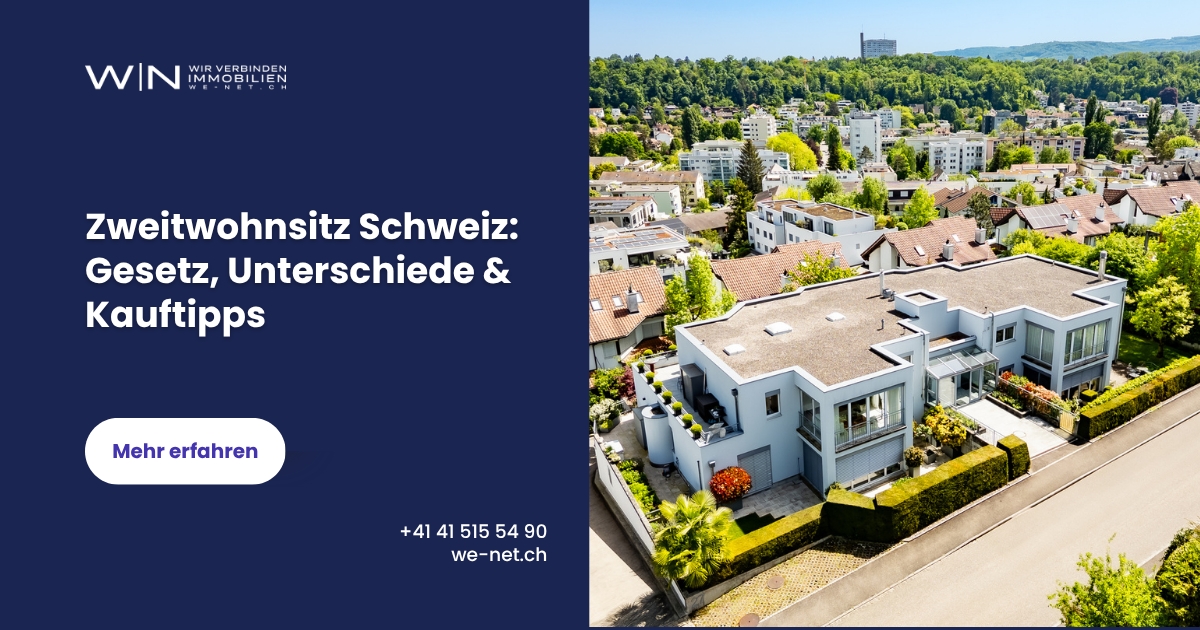ZWEITWOHNUNG – ZWEIT-/ ERSTWOHNSITZ? UNTERSCHIEDE ZUR REGELUNG IN DER SCHWEIZ
In der Schweiz gilt der Grundsatz der «Einheit des Wohnsitzes». Dies bedeutet, dass Sie innerhalb der Eidgenossenschaft grundsätzlich nur einen Wohnsitz im eigentlichen Sinne haben können, nämlich einen Hauptwohnsitz oder Erstwohnsitz. Es existieren jedoch Ausnahmen für sogenannte Zweitwohnungen in der Schweiz, wie beispielsweise Ferienwohnungen.
Mit der Annahme der Zweitwohnungsinitiative im Jahr 2012 sprachen sich die Schweizer Stimmberechtigten für eine Beschränkung des Zweitwohnungsbaus aus. Das Bundesgesetz über Zweitwohnungen (ZWG) setzt den Verfassungsartikel (Art. 75b BV) um und ist seit dem 1. Januar 2016 in Kraft. Alle Gemeinden sind verpflichtet, jährlich ein Wohnungsinventar zu erstellen. «Kalte Betten» und «leere Wohnungen» – mit diesen Schlagwörtern konnte das Schweizer Volk im März 2012 davon überzeugt werden, den Neubau von Zweitwohnungen zu beschränken. Das Gesetz zur Umsetzung ist in Kraft getreten. Die Baselbieter SP-Nationalrätin Susanne Leutenegger Oberholzer kämpfte damals für die Annahme der Zweitwohnungsinitiative. Wie bekannt wurde, hatte sie kurz vor der Abstimmung noch eine eigene Zweitwohnung gekauft. Frau Leutenegger Oberholzer erwarb zwei Wochen vor dem Abstimmungstermin eine Zweitwohnung im Feriendorf Valbella, das zur politischen Gemeinde Vaz/Obervaz gehört. In Vaz/Obervaz existieren laut Gebäude- und Wohnungsstatistik des Bundes rund 5’300 Wohnungen. Gemäss Schätzungen sind davon 76,6% Zweitwohnungen. Der Kauf wäre auch nach der Abstimmung weiterhin möglich gewesen, da die Nutzung von althergebrachten Wohnungen frei bleibt.
Ist ein solcher Kauf nach der neuen Gesetzeslage heute noch möglich? Und welche Punkte sind dabei zu beachten?
Diese und weitere Fragen klären wir umfassend in unserem Artikel rund um das Thema Zweitwohnsitz Schweiz.
RECHTSGRUNDLAGEN: VOLKSINITIATIVE UND ZWEITWOHNUNGSGESETZ
Verordnung zur Zweitwohnungsinitiative:
Seit dem 1. Januar 2013 gilt die sogenannte Zweitwohnungsverordnung (nach Annahme der Volksinitiative «Schluss mit uferlosem Bau von Zweitwohnungen» von Franz Weber, über die am 11.3.2012 abgestimmt wurde). Sie gilt für den Bau neuer Zweitwohnungen in Gemeinden mit einem Zweitwohnungsanteil von mehr als 20%. Solche Gemeinden dürfen neue Zweitwohnungen nur noch unter streng definierten Bedingungen bewilligen.
Definition einer Wohnung:
Was eine Wohnung ist, scheint klar. Das Gesetz ist jedoch präzise und definiert eine Wohnung als eine bauliche Einheit von Räumen, die bewohnbar ist und über eine Küche verfügt (Art. 2 Abs. 1 ZWG). Schauen wir deshalb, wann eine Wohnung als Erstwohnung gilt, um daraus die Definition der Zweitwohnung abzuleiten.
Primary residence:
Eine Erstwohnung liegt vor, wenn die Wohnung von mindestens einer Person genutzt wird, die sich in der Gemeinde niedergelassen hat (Art. 2 Abs. 2 ZWG). Einer Erstwohnung gleichgestellt ist eine Wohnung, wenn sie:
- zu Erwerbs- oder Ausbildungszwecken dauernd bewohnt ist;
- von einem Privathaushalt dauernd bewohnt wird, der im gleichen Gebäude eine andere Wohnung dauernd bewohnt;
- von Personen bewohnt wird, die sich nicht beim Einwohneramt melden müssen (bspw. Diplomaten);
- seit weniger als einem Jahr leer steht, bewohnbar ist und zur dauernden Miete oder zum Verkauf angeboten wird (sog. Leerwohnungen);
- zu landwirtschaftlichen Zwecken genutzt wird und aufgrund der Höhenlage nicht das ganze Jahr zugänglich ist;
- zur kurzzeitigen Unterbringung von Personal von Unternehmen genutzt wird;
- als Dienstwohnung genutzt wird (Gastgewerbe, Spital oder Heime);
- oder rechtmässig vorübergehend anders als zum Wohnen genutzt wird (Art. 2 Abs. 3 ZWG).
WAS IST EIN ZWEITWOHNSITZ NACH GESETZESVERSTÄNDNIS?
Als Zweitwohnung im Sinne des ZWG gelten Wohnungen, die weder Erstwohnungen sind noch Erstwohnungen gleichgestellt sind (Art. 2 Abs. 4 ZWG). Es handelt sich dabei um Wohnungen, die nicht von Personen mit Hauptwohnsitz in der betreffenden Gemeinde noch zu beruflichen oder schulischen Zwecken dauernd genutzt werden. Zweitwohnungen in der Schweiz werden in der Regel zu Ferienzwecken genutzt und oft an Dritte vermietet.
Die Restriktion: Neue Zweitwohnungen sind nur noch in Gemeinden erlaubt, in denen der Anteil an Zweitwohnungen nicht mehr als 20% aller Wohnungen beträgt. Altrechtliche Zweitwohnungen bleiben bestehen. Neue Wohnungen werden in betroffenen Gemeinden nur noch bewilligt, wenn es Erstwohnungen sind oder sie touristisch bewirtschaftet werden. Wer sich nicht an die Vorgaben hält, riskiert eine Busse und die zwangsweise Vermietung der Wohnung.
ZWEITWOHNUNG, ZWEITWOHNSITZ ODER ERSTWOHNSITZ? DIE WOHNRECHTLICHEN UNTERSCHIEDE
Eine Zweitwohnung nach ZWG ist nicht dasselbe wie ein Nebenwohnsitz oder ein 2. Wohnsitz im melderechtlichen Sinne.
Der Begriff «Zweitwohnsitz Schweiz» wird zwar regelmässig genutzt, existiert aber aus rechtlicher Sicht im strengen Sinne nicht, da in der Schweiz der Grundsatz der «Einheit des Wohnsitzes» herrscht. Sie dürfen nur einen Wohnsitz im eigentlichen Sinne (den Lebensmittelpunkt) haben.
Ein sogenannter Nebenwohnsitz dient meist Ausbildungs- oder Arbeitszwecken (sogenannter «Wochenaufenthalt») und wird rechtlich als Aufenthaltsort qualifiziert, nicht als Wohnsitz.
Der Lebensmittelpunkt ist entscheidend:
- Bei Familien ist der Wohnort der Familie der Hauptwohnsitz, selbst wenn Sie mehr Zeit an Ihrem Arbeitsort verbringen.
- Bei Einzelpersonen kann der Lebensmittelpunkt der Ort sein, an dem Sie unter der Woche arbeiten – auch wenn Sie am Wochenende an Ihren Hauptwohnsitz zurückkehren.
- Steuern zahlen Sie in der Schweiz am Hauptwohnsitz. Nur die Steuern im Zusammenhang mit Immobilienbesitz werden in der zuständigen Gemeinde fällig.
Je nach persönlichen Verhältnissen kommen folgende Situationen als Aufenthaltsort für sogenannte Wochenaufenthalter in Frage:
- Vorrang des Arbeitsorts vor dem Familienort
- Vorrang des Familienorts vor dem Arbeitsort
- Getrennte Wohnsitze von Ehegatten
- Grenzüberschreitender Zweitwohnsitz
SPEZIELLE FALLBEISPIELE
Dauercamper als Zweitwohnsitz anmelden?
Ist das Wohnen auf dem Dauercampingplatz ein Nebenwohnsitz? Dies wird in vielen Gemeinden untersagt, um sogenannte «Trailer-Parks» zu vermeiden. Viele Gemeinden verwehren die dauerhafte Nutzung von Campingplätzen. Bezüglich Hauptwohnsitz ist es noch strikter: Obwohl Dauercamper oft wie ein Hauptwohnsitz eingerichtet sind, ist offizielles Wohnen auf Campingplätzen nur selten erlaubt. Oft ist das Übernachten nur für eine gewisse Zeitraum bzw. eine begrenzte Anzahl an Tagen oder Monaten gestattet. Wer zu 100% auf dem Campingplatz oder in einem Tiny House wohnt, muss dies als Erstwohnsitz bzw. Hauptwohnsitz anmelden.
Sanktionen bei Verstoss gegen die Vorgaben
Wird eine Wohnung nicht rechtmässig genutzt, kann die zuständige Behörde wie folgt vorgehen:
- Sie verlangt mit einer Nachfrist die auflagenkonforme Nutzung.
- Andernfalls kann sie die Wohnung versiegeln lassen und eine Busse von max. 10’000 Franken verhängen (Art. 292 StGB).
- Anschliessend kann die Wohnung durch die Gemeinde vermietet werden (Art. 18 ZWG).
Bauverbot (20%-Grenze)
In jeder Gemeinde mit einem Anteil an Zweitwohnungen von mehr als 20% dürfen keine neuen Zweitwohnungen mehr gebaut werden (Art. 6 Abs. 1 ZWG).
Feststellung des Zweitwohnungsanteils
Jede Gemeinde in der Schweiz ist verpflichtet, ein Wohnungsinventar zu erstellen (Art. 4 ZWG). Anhand der Anzahl der Wohnungen und der Anzahl der Erstwohnungen (inkl. gleichgestellter Wohnungen) kann die Anzahl der Zweitwohnungen und somit der prozentuale Anteil festgestellt werden.
Pflicht zum Wohnungsinventar: Ja. Unterlässt eine Gemeinde die Erstellung des Inventars, wird angenommen, dass der Zweitwohnungsanteil in der entsprechenden Gemeinde höher als 20% ist (Art. 5 Abs. 2 ZWG).
Neubauten in Gemeinden mit über 20% Zweitwohnungsanteil
Wenn eine Gemeinde einen Zweitwohnungsanteil von über 20% aufweist, dürfen neue Wohnungen nur bewilligt werden, wenn sie folgendermassen genutzt werden:
- Primary residence
- Dwelling that is equivalent to a primary residence
- Touristisch bewirtschaftete Wohnung (Art. 7 Abs. 1 ZWG)
Solche neuen Wohnungen werden mit einer Nutzungsbeschränkung versehen.
DIE TOURISTISCH BEWIRTSCHAFTETE WOHNUNG
Was ist touristische Bewirtschaftung?
Eine Wohnung wird touristisch bewirtschaftet, wenn sie dauerhaft zur ausschliesslichen kurzzeitigen Nutzung durch Gäste angeboten wird und die Bedingungen markt- und ortsüblich sind (Art. 7 Abs. 2 ZWG). Dies soll «warme Betten» schaffen. Eine langfristige Vermietung ist daher ausgeschlossen, da eine gewisse Intensität der Nutzung sichergestellt werden muss.
Weitere Voraussetzungen: Die genauen Voraussetzungen sind komplex. Die Bewirtschaftung kann im Rahmen eines strukturierten Beherbergungsbetriebes (z.B. Hotelresorts) erfolgen oder es müssen strenge Kriterien erfüllt sein, wie etwa eine Zertifizierung für die Qualitätskategorie, grösstmögliche Verfügbarkeit in der Hauptsaison und die Vorsehung im kantonalen Richtplan.
ZWEITWOHNSITZ FÜR SCHWEIZER UND AUSLÄNDER
What applies to Swiss nationals?
Der Hauptwohnsitz ist die Niederlassungsgemeinde, wo der Heimatschein hinterlegt ist. Der Nebenwohnsitz (Aufenthaltsgemeinde) erfordert die Hinterlegung eines Heimatausweises. Die Bedingungen für einen Nebenwohnsitz/Wochenaufenthalt sind:
- Sie halten sich als Wochenaufenthalter für einen bestimmten Zweck (Ausbildung, Arbeit etc.) in der Gemeinde auf und haben keine Absicht eines dauernden Verbleibens.
- The stay lasts at least three consecutive months or you spend a total of at least three months during one year in the municipality of secondary residence.
Was gilt für Angehörige anderer Staaten? Ausländer mit Zweitwohnsitz in der Schweiz
Ausländer, die eine Ferien- oder Zweitwohnung erwerben wollen, benötigen teils eine Bewilligung (Lex Koller). Bei ausländischen Staatsangehörigen ist der Hauptwohnsitz in der Gemeinde, wo die Aufenthalts- (Kategorie B) bzw. die Niederlassungsbewilligung (Kategorie C) erteilt wurde.
Hinweise für Ausländer und Grenzgänger:
- Wer sich weniger als 90 Tage pro Jahr als Nichterwerbstätiger in der Schweiz aufhält, benötigt keine gesonderte Aufenthaltsbewilligung.
- Grenzgänger (Ausweis G): Wer regelmässig in der Schweiz arbeitet und nach der Arbeit an den Wohnort im Ausland zurückkehrt, hat weder einen Haupt- noch einen Nebenwohnsitz in der Schweiz. Diese Personen werden im Einwohnerregister nicht registriert.
- Wochenaufenthalter (Ausländer): Wohnen Sie während der Woche in einer schweizerischen Gemeinde und kehren mindestens einmal wöchentlich an den ausländischen Wohnsitz zurück, sind Sie unter dem Meldeverhältnis 3 registriert («Die Person ist in der Gemeinde gemeldet, hat aber keinen Hauptwohnsitz in der Schweiz»).
- Steuern: Steuern für eine Zweitwohnung fallen für Ausländer nur dann an, wenn sie in der Schweiz Einkünfte durch Arbeit erzielen und sich mehr als 6 Monate pro Jahr im Land aufhalten. Andernfalls gilt man als «Steuerausländer» oder «Grenzgänger» und zahlt die Einkommenssteuern im Heimatland.
Wichtige Hinweise zum Kauf
- Obergrenze Aparthotels: Es gibt eine Obergrenze von 1.500 Wohneinheiten, die an ausländische Personen verkauft werden dürfen (auf die Kantone verteilt). In Kantonen wie Genf und Zürich ist der Verkauf von Ferienwohnungen an Ausländer sogar gänzlich verboten.
- Kosten und Steuern: Eine Zweitwohnung verursacht Kosten. Die Besteuerung ist komplex und hängt von vielen Umständen ab. Hier ist der Beizug von Fachleuten (wie der WENET AG) ratsam.
Umnutzung von bestehenden Zweitwohnungen
Alle Zweitwohnungen, die vor dem 11. März 2012 bereits bestanden oder rechtskräftig bewilligt waren (althergebrachte Wohnungen), sind in der Art und Weise, wie sie genutzt werden, frei (Art. 12 Abs. 1 ZWG). Bestehende Zweitwohnungen müssen daher nicht umgenutzt werden und althergebrachte Erstwohnungen dürfen zu Zweitwohnungen umfunktioniert werden, solange dies nicht missbräuchlich geschieht.
Umbau und Erneuerung altrechtlicher Wohnungen
Altrechtliche Wohnungen dürfen im Umfang der bestehenden Hauptnutzungsfläche umgebaut, erneuert und wieder aufgebaut werden.
Erweiterung: Wer seine altrechtliche Wohnung erweitert und dadurch neue Hauptnutzungsfläche schafft, darf dies nur, wenn die neu geschaffene Fläche als Erstwohnung oder als touristisch bewirtschaftete Wohnung genutzt wird (Art. 12 Abs. 3 ZWG). Diese Wohnung erhält dann eine Nutzungsbeschränkung wie eine reguläre neue Wohnung.
Conclusion
Die Rechtslage rund um den Zweitwohnsitz Schweiz ist aufgrund des Bundesgesetzes über Zweitwohnungen (ZWG) und des Prinzips der Einheit des Wohnsitzes komplex und mit strikten Nutzungsauflagen verbunden. Insbesondere in Gemeinden mit einem Zweitwohnungsanteil von über 20% ist der Neubau stark eingeschränkt und der Kauf von Bestandesliegenschaften erfordert eine präzise rechtliche Prüfung. Die Unterscheidung zwischen einer Zweitwohnung (nach ZWG), einem Nebenwohnsitz (Wochenaufenthalt) und dem steuerrechtlichen Hauptwohnsitz ist dabei für die korrekte Nutzung und Besteuerung essenziell.
Der Erwerb, die Umnutzung oder der Umbau einer Immobilie in der Schweiz bedarf einer sorgfältigen Analyse der aktuellen Rechtslage. Vertrauen Sie bei der Klärung dieser komplexen Fragen auf ausgewiesene Experten.
Kontaktieren Sie die WENET AG: Wir bieten Ihnen umfassende Beratung zur Einhaltung des ZWG, zur steuerlichen Optimierung Ihres Immobilienbesitzes und zur korrekten Klassifizierung Ihrer Wohnsituation.

